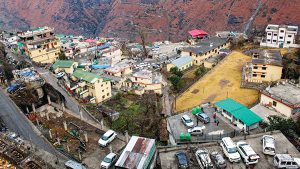Bloomberg
India has relocated some troops from areas surrounding a sinking Himalayan town that’s near a disputed border with China, Army Chief Manoj Pande said.
Pande didn’t give details on how many soldiers would be moved away for safety but said over 20 military installations around the town of Joshimath in the northern state of Uttarakhand have sustained “medium to minor damage.â€
“We remain prepared to relocate more units if required, but our operational preparedness remains intact,†Pande said in an annual address of the state of the army’s operations. “There has been no impact to our readiness.â€
The gateway town for mountain expeditions and Hindu pilgrimage sites like Badrinath has seen rapid infrastructure growth plus massive tourist footfalls. This has, in turn, damaged its ecosystem and triggered frequent landslides and flash floods.
The area is a also a key Indian garrison center to defend a large portion of the disputed 3,488-kilometer (2,170-mile) border with China known as the Line of Actual Control. India has over 20,000 troops and military hardware including artillery and missile systems located in the area.
The Supreme Court of India is set to hear a plea from a local Hindu religious leader on Jan. 16 after cracks began to appear in more than 600 buildings in the tiny town. The petition seeks to halt construction of a hydroelectric project that it says is causing the sinking The crisis has reignited a decades-old development versus environment debate in the region.
While relief and rescue operations for affected families are underway, the lawsuit in India’s top court has sought legal intervention in halting work on a tunnel being built by state-run NTPC Ltd. for its nearby hydroelectric power project until it’s examined and approved by a panel of geologists, hydrologists and engineers.
India rallies support
for Global South ahead of G-20 meetings
India’s Prime Minister Narendra Modi rallied support for the developing nations of the Global South that are grappling with economic hardships ranging from rising oil prices to shortages in food and fertilizers.
“As far as India is concerned, your voice is India’s voice. Your priorities are India’s priorities,†Modi said Thursday, at the start of a two-day virtual summit of as many as 120 developing countries. “People of the Global South should no longer be excluded from the fruits of developments.â€
The Voice of Global South meeting is one of the ways India is looking to build a pressure group as it takes over the chair of the Group of 20 nations this year.
“India has always stood for a greater role for developing countries in determining our common future,†Modi said at the summit. “In the 21st century, global growth will come from countries of the South.â€
In recent years India has actively sought closer ties with the US and its western allies to counter an economically and militarily assertive China. This had often come at the expense of its engagement with developing countries. New Delhi is now looking to fix that balance, especially as it also faces a hit from soaring commodity prices, especially in the aftermath of Russia’s war in Ukraine.
“India, as a developing country, is more concerned about the rising prices and shortage of fertilizer, fuel and food,†Sushant Singh a senior fellow at the Centre for Policy Research and guest lecturer at Yale University said. “The G-20 provides a platform to India to raise the voices of these countries, and increase its bargaining power and standing in the grouping.â€
 The Gulf Time Newspaper One of the finest business newspapers in the UAE brought to you by our professional writers and editors.
The Gulf Time Newspaper One of the finest business newspapers in the UAE brought to you by our professional writers and editors.
